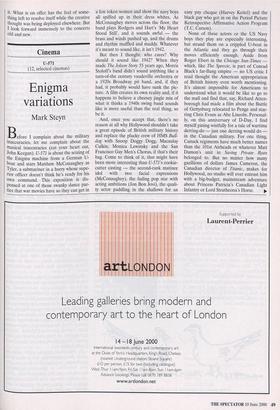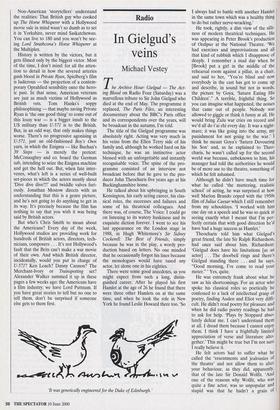Cinema
U-571 (12, selected cinemas)
Enigma variations
Mark Steyn
inaccuracies, let me complain about the musical inaccuracies (eat your heart out, John Keegan). U-571 is about the seizing of the Enigma machine from a German U- boat and stars Matthew McConaughey as Tyler, a submariner in a hurry whose supe- rior officer doesn't think he's ready for his own command. This exposition is dis- pensed at one of those swanky dance par- ties that war movies have so they can get in a few token women and show the navy boys all spilled up in their dress whites. As McConaughey moves across the floor, the band plays Rodgers and Hart's 'My Heart Stood Still', and it sounds awful — the brass and winds pushed up, and the drums and rhythm muffled and muddy. Whatever it's meant to sound like, it isn't 1942.
But then I thought: who cares? Why should it sound like 1942? When they made The Jolson Story 55 years ago, Morris Stoloff's band didn't sound anything like a turn-of-the century vaudeville orchestra or a 1920s Broadway pit band, and, if they had, it probably would have sunk the pic- ture. A film creates its own reality and, if it happens to believe a cheesey jingle mix of what it thinks a 1940s swing band sounds like is more useful than the real thing, so be it.
And, once you accept that, there's no reason at all why Hollywood shouldn't take a great episode of British military history and replace the plucky crew of HMS Bull- dog with Snoop Doggy Dogg, Macaulay Culkin, Monica Lewinsky and the San Francisco Gay Men's Chorus, if that's their bag. Come to think of it, that might have been more interesting than U--571's cookie- cutter casting — the second-rank matinee idol with two facial expressions (McConaughey), the fading pop star with acting ambitions (Jon Bon Jovi), the quali- ty actor paddling in the shallows for an easy pay cheque (Harvey Keitel) and the black guy who got in on the Period Picture Retrospective Affirmative Action Program (T.C. Carson).
None of these actors or the US Navy boys they play are especially interesting, but strand them on a crippled U-boat in the Atlantic and they go through their moves efficiently enough. Aside from Roger Ebert in the Chicago Sun-Times which, like The Speccie, is part of Conrad Black's far-flung empire — no US critic I read thought the American appropriation of British history even worth mentioning. It's almost impossible for Americans to understand what it would be like to go to the mall and find that, say, Richard Atten- borough had made a film about the Battle of Gettysburg relocated to Penge and star- ring Chris Evans as Abe Lincoln. Personal- ly, on this anniversary of D-Day, I find myself pining wistfully for a tale of wartime derring-do — just one derring would do in the Canadian military. For one thing, Canuck regiments have much better names than the 101st Airheads or whatever Matt Damon's unit in Saving Private Ryan belonged to. But no matter how many gazillions of dollars James Cameron, the Canadian director of Titanic, makes for Hollywood, no studio will ever entrust him with a big-budget, mainstream adventure about Princess Patricia's Canadian Light Infantry or Lord Strathcona's Horse. 1111. Non-American 'storytellers' understand the realities: That British guy who cooked up The Horse Whisperer with a Hollywood movie sale in mind wasn't so dumb as to set it in Yorkshire, never mind Saskatchewan. You can live to 180 and you won't be see- ing Lord Strathcona's Horse Whisperer at the Multiplex.
History is written by the victors, but it gets filmed only by the biggest victor. Most of the time, I don't mind: for all the atten- tion to detail in how the severed arteries gush blood in Private Ryan, Spielberg's film is ludicrous — the projection of a contem- porary Oprahfied sensibility onto the hero- ic past. In that sense, American veterans are just as much victims of Hollywood as British vets. Tom Hanks's soppy philosophising — that maybe saving Private Ryan is 'the one good thing' to come out of this lousy war — is a bigger insult to the US military than U-571 is to the British. But, in an odd way, that only makes things worse. There's no progressive agonising in U-571, just an old-fashioned Boy's Own yarn, in which the Enigma — like Buchan's 39 Steps — is merely the pretext: McConaughey and co. board the German sub, intending to seize the Enigma machine and get the hell out. But, when fate inter- venes, what's left is a series of well-built set-pieces in which the actors mostly shout `Dive dive dive!!!' and twiddle valves furi- ously. Jonathan Mostow directs with an understanding that this is a genre picture, and he's not going to do anything to get in its way. It's precisely because the film has nothing to say that you wish it was being said by British actors.
But who's Chris Smith to moan about the Americans? Every day of the week, Hollywood studios are providing work for hundreds of British actors, directors, tech- nicians, composers . . . It's not Hollywood's fault that the Brits can't make a war movie of their own. And which British director, incidentally, would you put in charge of U-571? Ken Loach? Danny Cannon? The Merchant-Ivory or Trainspotting set? Alexander Walker summed it up in these pages a few weeks ago: the Americans have a film industry; we have Lord Puttnam. If you have great stories to tell but no one to tell them, don't be surprised if someone else gets to them first.
It was genetically engineered for the Duke of Edinburgh.'

































































 Previous page
Previous page